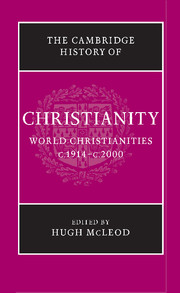Book contents
- Frontmatter
- 1 Introduction
- 2 Being a Christian in the early twentieth century
- PART I INSTITUTIONS AND MOVEMENTS
- 3 The papacy
- 4 Ecumenism
- 5 Christianity, colonialism and missions
- 6 The Pentecostal and Charismatic movements
- 7 Independency in Africa and Asia
- PART II NARRATIVES OF CHANGE
- PART III SOCIAL AND CULTURAL IMPACT
- Bibliography
- Index
- References
5 - Christianity, colonialism and missions
from PART I - INSTITUTIONS AND MOVEMENTS
Published online by Cambridge University Press: 28 March 2008
- Frontmatter
- 1 Introduction
- 2 Being a Christian in the early twentieth century
- PART I INSTITUTIONS AND MOVEMENTS
- 3 The papacy
- 4 Ecumenism
- 5 Christianity, colonialism and missions
- 6 The Pentecostal and Charismatic movements
- 7 Independency in Africa and Asia
- PART II NARRATIVES OF CHANGE
- PART III SOCIAL AND CULTURAL IMPACT
- Bibliography
- Index
- References
Summary
Introduction
In 1910 Rennie McInnes, an Anglican missionary in Cairo, enthusiastically pointed out that King Edward VII ruled over more Muslims than Persia and the Ottoman empire combined. ‘Who would doubt the issue of this glorious conflict?’ he concluded, confident that Islam would wither away under the combined onslaught of Christian mission and colonial rule.
As a result of the 1914–18 war the Ottoman empire collapsed and many of its territories came under control of Western powers. The independence of Persia was further eroded. But the war also brought a loss of confidence in the ability of Christianity, even with the support of colonialism, to undermine Islam. In 1909 McInnes’ colleague in Cairo, William Temple Gairdner, had produced a little book, The reproach of Islam, designed to convince Christian students in British and American universities of the need for evangelism to the Muslim world. Yet Gairdner was already developing a more sober realism, a less assertive style, a humbler approach, qualities which he was to develop further in the decade between the end of the war and his death in 1928 and which were to make him one of the great Christian Islamists of the twentieth century.
- Type
- Chapter
- Information
- The Cambridge History of Christianity , pp. 71 - 88Publisher: Cambridge University PressPrint publication year: 2006
References
- 1
- Cited by

